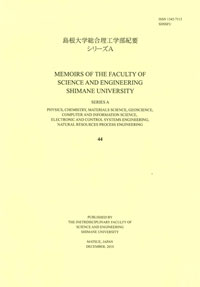島根大学総合理工学研究科
ISSN:1342-7113

ダウンロード数 : ? 件
この文献の参照には次のURLをご利用ください : https://ir.lib.shimane-u.ac.jp/4684
島根大学総合理工学部紀要.シリーズA 36
2002-12-24 発行
石炭灰を利用した気泡混合軽量土の一軸圧縮特性に及ぼす混練水の影響
Effects of Mixing Water on Unconfined Compressive Characteristics of Foamed Mixture Lightweight Soils Utilizing Coal Ash
ファイル
内容記述(抄録等)
Coal ash is generated in vast quantities as a by-product of burning coal at electric power plants. When some coal ashes are mixed with water, they are self-hardening, and set to create a high-strength, lightweight, low-permeability material. These properties make coal ash useful as a construction material. However, about 30% of coal ash in Japan is disposed of by burial in landfills or storage in lagoons. If the coal ash is effctively utilized as a construction material, the problems ofcoal ash disposal in power stations and shortage of natural resources for construction will be solved. Recently, coal ash has been widely used for stabilizing soils. Use of foamed mixture light weight soils has also had a significant impact on countermeasures lessening soft ground deformation, earth pressure, overburden pressure, and the like.
This paper describes the effects of mixing water (fresh water or seawater) on unconfined compressive characteristics of foamed mixture lightweight soils utilizing coal ash. The effects of curing time on stress-strain behavior of foamed mixture lightweight soils are quantitatively shown. The unconfined compressive strength of foam mixture lightweight soils can be represented as a hyperbolic relationship between unconfined compressive strength and curing time. Empirical relationships between unconfined compressive strength and water content and dry densities have been also developed. Our findings suggest that seawater is more effective than fresh water. Selection of the best mixing water is thus essential.
This paper describes the effects of mixing water (fresh water or seawater) on unconfined compressive characteristics of foamed mixture lightweight soils utilizing coal ash. The effects of curing time on stress-strain behavior of foamed mixture lightweight soils are quantitatively shown. The unconfined compressive strength of foam mixture lightweight soils can be represented as a hyperbolic relationship between unconfined compressive strength and curing time. Empirical relationships between unconfined compressive strength and water content and dry densities have been also developed. Our findings suggest that seawater is more effective than fresh water. Selection of the best mixing water is thus essential.
About This Article
Other Article
